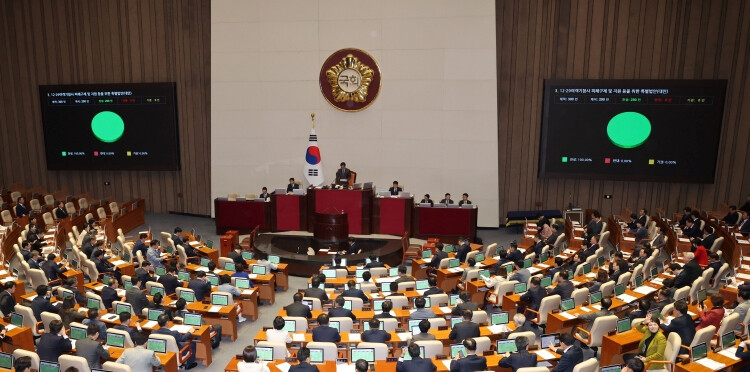
Seoul, South Korea - The South Korean National Assembly has passed a 13.8 trillion won (approximately $10.1 billion USD) supplementary budget (Chugyeong) aimed at providing relief for citizens and supporting recovery efforts from recent wildfires. The budget, approved on May 1st, comes just nine days after the government submitted its initial proposal of 12.2 trillion won. The final version reflects a 1.6 trillion won increase, largely due to the inclusion of 400 billion won for local currency vouchers (regional love gift certificates), a key demand from the Democratic Party of Korea.
The parliamentary vote, held late in the evening, saw 241 out of 272 lawmakers in attendance vote in favor, with 6 against and 25 abstaining. This approval comes amidst a politically charged atmosphere, with the June 3rd presidential election looming just a month away, following the impeachment of former President Yoon.
Key Components of the Supplementary Budget:
Local Currency Vouchers (Regional Love Gift Certificates): 400 billion won has been allocated, fulfilling a significant demand from the Democratic Party, particularly championed by presidential candidate Lee Jae-myung. This initiative aims to stimulate local economies by encouraging spending within communities.
Wildfire Recovery and Agricultural Support: 200 billion won has been added to aid regions devastated by recent wildfires and to provide discounts on agricultural and fishery products. This includes 8 billion won for fixed-wing aircraft water tanks for fire prevention, 5 billion won for thermal imaging cameras on Korea Forest Service helicopters, and 2 billion won for fire suppression facilities in traditional temples. Additionally, support for residents whose homes were completely destroyed has been increased to 100 million won, up from the previous 20-36 million won range.
Social Infrastructure (SOC) and Housing: 800 billion won has been allocated to support rental housing and infrastructure projects, including roads and railways. Notably, 28.7 billion won has been earmarked for the early repair of aging sewage pipes in Seoul, addressing concerns following recent sinkhole incidents.
Education and Disaster Preparedness: 115.7 billion won has been added to university national scholarship funds, and 30 billion won has been allocated for summer flood prevention measures.
Law Enforcement and Auditing: Funding for specific activities within the prosecution and the Board of Audit and Inspection, which had been previously cut, has been restored. This includes 50 billion won for prosecution investigations into drug and deepfake sexual crimes and 4.5 billion won for the Board of Audit and Inspection.
Technology and AI Development: 100 billion won has been added to enhance competitiveness in trade and artificial intelligence. This includes funding for increased GPU rentals for businesses and academia, as well as the acceleration of AI-based cyberattack detection systems following a recent SK Telecom USIM data leak.
Political Dynamics and Negotiations:
The budget's passage was marked by intense negotiations between the Democratic Party and the People Power Party. The Democratic Party advocated for a larger supplementary budget to address economic hardships, while the People Power Party emphasized fiscal prudence.
A breakthrough was achieved when both parties agreed to compromise on the local currency voucher and law enforcement funding issues. Park Chan-dae, acting leader and floor leader of the Democratic Party, expressed gratitude to the People Power Party for agreeing to include the local currency voucher funding. However, the Democratic Party also stated that the budget was insufficient and that further measures would be necessary, hinting at the possibility of another supplementary budget if Lee Jae-myung wins the presidential election.
Kwon Seong-dong, floor leader of the People Power Party, emphasized the need for fiscal responsibility, stating that the budget would add to the national debt. He stressed that the government and his party aimed to minimize this debt and only include essential items.
Context and Implications:
This supplementary budget comes at a critical time for South Korea, as the nation grapples with economic challenges exacerbated by the COVID-19 pandemic and the recent wildfires. The inclusion of local currency vouchers reflects a growing emphasis on stimulating local economies and providing direct support to citizens.
The restoration of funding for law enforcement and auditing activities highlights the ongoing political tensions surrounding these institutions. The Democratic Party's emphasis on transparency in the use of these funds underscores the importance of accountability.
The investment in technology and AI development reflects South Korea's commitment to maintaining its competitive edge in these critical sectors. The acceleration of cyberattack detection systems is particularly significant in light of recent data breaches.
The approval of this budget signifies a temporary truce in the political battles leading up to the presidential election. However, the underlying tensions and differing economic philosophies of the two major parties are likely to continue to shape the political landscape in the coming months.
[Copyright (c) Global Economic Times. All Rights Reserved.]




























